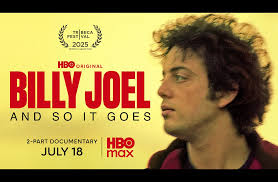By law, at least by Long Island law, you’re required to love Billy Joel. It’s like bagels on Sundays or complaining about LIE traffic. It’s part of the culture. But for me, Billy wasn’t some punchline or nostalgic default. I’ve loved Billy Joel since I was eight years old, spinning my aunt’s Glass Houses vinyl in her living room like it was sacred scripture.
There’s something about that album, the clink of “You May Be Right,” the sharp jab of “It’s Still Rock and Roll to Me,” the whole messy, brilliant energy of a guy who could write an arena anthem one minute and a piano ballad the next. Even back then, I knew this guy wasn’t just another singer, he was telling stories. He was ours. A flawed, brilliant, bare-souled storyteller who just happened to be from Hicksville.
So when HBO dropped their new documentary on Billy, I cleared the schedule. I expected the hits, the Madison Square Garden footage, the archival reels of the ’80s hair. But what I didn’t expect, what I loved, was the honesty. The whole thing was deeply human. Billy Joel, not as some sanitized Rock & Roll Hall of Famer, but as a guy who tried, failed, hurt people, got hurt, and still kept singing.
And let’s talk about the wives. All four. Three exes, one current, all in the documentary. That’s unheard of. Usually you get one ex with an NDA and some grainy wedding footage. But here? You got Christie Brinkley, Katie Lee, Alexis Roderick, and even his first wife, Elizabeth, all showing up, not just as soundbites, but as full people, reflecting on the man behind the piano. That doesn’t happen unless there’s still some kind of love there. That’s the mark of a guy who, for all his faults, didn’t torch the bridges he walked away from.
Billy admits he’s a flawed man. He talks about it. He jokes about it. He owns it. That kind of vulnerability is rare, especially in musicians of his stature. The HBO doc doesn’t whitewash the pain or glamorize the chaos. It just shows it. The drinking. The divorces. The loneliness behind the sold-out tours. It’s a reminder that the man who gave us “Vienna” and “Scenes from an Italian Restaurant” isn’t some mythical figure. He’s just a guy from Long Island with a piano and a complicated life.
That’s why I’ll always respect him. He didn’t try to be perfect. He tried to be real. Whether he was writing about Anthony in the bar, Brenda and Eddie’s failed marriage, or the fire we didn’t start, he captured something that most artists can’t, us. Our flaws, our hopes, our screwups, our second chances.
So yeah, maybe Long Island is legally obligated to love Billy Joel. But I don’t love him because I have to. I love him because he’s messy and brilliant and raw. I love him because I grew up with Glass Houses, and because I’ve seen what it looks like when someone keeps making music even after the spotlight dims a little.
And now, thanks to this HBO doc, we all get to see it too.







